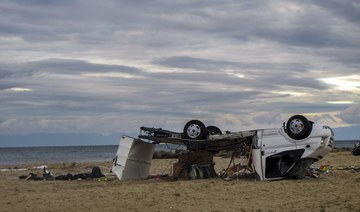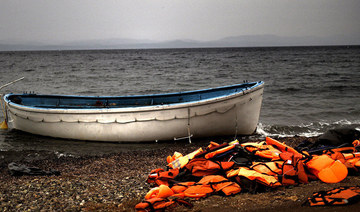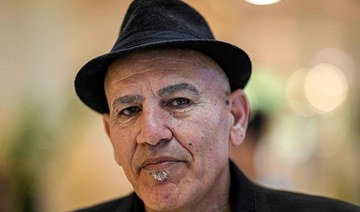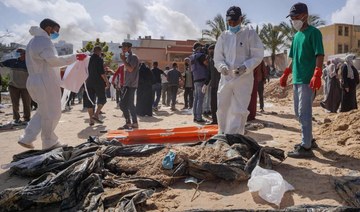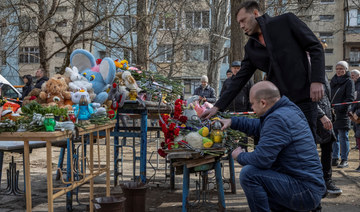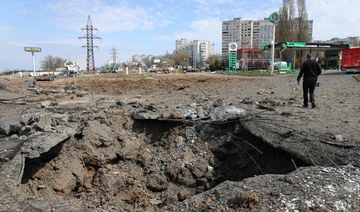ATHENS: Athenians settled for an uneasy night Friday after a strong 5.1-magnitude earthquake temporarily knocked out phone connections, damaged buildings and caused power outages.
Noting that many people were likely afraid to sleep indoors, citizen’s protection minister Michalis Chrysohoidis said additional police would be deployed and remain on standby for the entire weekend.
“We are here next to you, we will not leave, we will not sleep until all danger has receded...we will overcome this together,” Chrysohoidis said in a televised statement.
The quake struck at 1113 GMT northwest of Athens, close to where a 5.9-magnitude quake in September 1999 left 143 people dead in and around the capital.
State TV ERT reported that at least four people were slightly hurt — including a pregnant tourist and a young boy — and at least two abandoned buildings in the capital collapsed, while several more suffered damage.
Traffic jams were caused in parts of the capital where power cuts knocked out traffic lights.
“It was a very intense quake, we were terrified, everyone started coming out (of the building),” a young woman named Katerina told AFP outside the six-story cosmetics store where she works.
A government spokesman later Friday said “life in Athens is back to normal.”
Friday’s emergency was the second in just over a week for the new conservative administration of Prime Minister Kyriakos Mitsotakis, who took office after a July 7 election.
In the city center, the marble cupola cross of a historic 19th century church came loose and shattered onto the street below.
Another central Athens church had its cupola cross snapped by the tremor, and a disused cargo conveyor belt at the port of Piraeus collapsed, TV footage showed.
And a Byzantine-era monastery on the outskirts of Athens was also damaged, the culture ministry said.
The culture ministry said the pregnant tourist was visiting the National Archaeological Museum and was struck by another visitor rushing for the exit.
She was hospitalized as a precaution, the ministry said.
The boy was struck by a falling chimney, ERT said.
News channels broadcast images sent in by viewers which also showed parked cars in central Athens damaged by fallen masonry.
Cracks also appeared in some walls in Greece’s 170-year-old parliament building.
“It was more like an explosion,” another woman told ERT on the city’s central Syntagma Square.
“We were all very afraid, so we’ll stay here for a couple of hours.”
Government spokesman Stelios Petsas said on television that phone networks had become “overcharged” by the sheer number of users calling to check up on friends and family.
SKAI TV said there were 20,000 calls per second, more than on New Year’s Eve.
The fire department rescued 30 people trapped in elevators in the capital, the citizen’s protection minister said.
According to the Greek geodynamic institute, the quake had its epicenter was near the town of Magoula, 23 kilometers (14 miles) northwest of Athens, and was followed by over a dozen aftershocks.
It had a depth of 13 kilometers, it said.
State engineers were out checking buildings for structural damage, and two helicopters overflew the quake’s epicenter, officials said.
Worried residents and office staff quickly gathered in outdoor areas, and department stores asked shoppers to leave but the government denied it had ordered an evacuation alert.
“People must remain calm,” said Efthymios Lekkas, head of the state anti-quake protection agency.
“There is no reason for concern. The capital’s buildings are built to withstand a much stronger earthquake,” he told ERT.
The US geological institute said Friday’s quake had a magnitude of 5.3.
“For the time being we cannot be sure whether this was the main earthquake,” seismologist Gerassimos Papadopoulos told ERT.
“There have been at least three (smaller) aftershocks already, which is a positive sign,” he said, adding that the quake was felt as far as the Peloponnese peninsula.
“People in the capital must remain calm... they must be psychologically ready for more aftershocks,” he said.
In another natural disaster earlier this month, seven people died and at least 23 were injured — most of them tourists — as a fierce storm ripped through beachfronts in Halkidiki, one of Greece’s top tourist areas on July 10.
Greece lies on major fault lines and is regularly hit by earthquakes, but they rarely cause casualties.
In July 2017, a 6.7-magnitude earthquake killed two people on the island of Kos in the Aegean sea, causing significant damage.
Strong quake hits near Greek capital of Athens, 4 hurt
Strong quake hits near Greek capital of Athens, 4 hurt

- A strong earthquake centered northwest of Athens caused frightened residents to run into the capital’s streets and damage several buildings
- Authorities said four people were hospitalized with injuries, none of them serious
Major arrests at NYU campus as Gaza protests spread
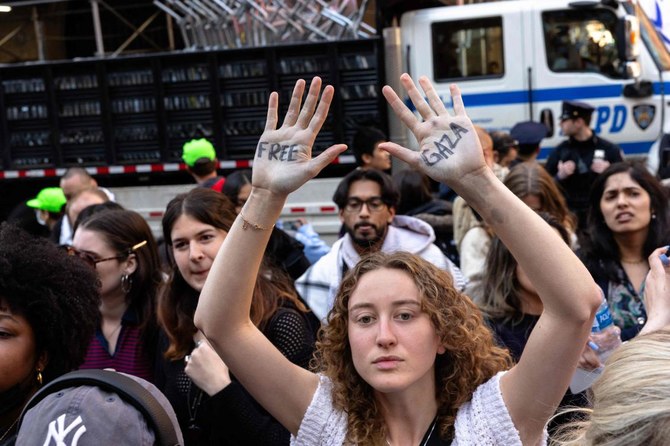
- Some of America’s most prestigious universities have been rocked by protests in recent weeks
- On Tuesday, the New York Police Department said 133 people had been arrested at NYU and released after being issued with court summons
NEW YORK: More than 130 people were arrested overnight during pro-Palestinian protests at the New York University campus, as student demonstrations gather pace in the United States over the Israel-Hamas war.
Some of America’s most prestigious universities have been rocked by protests in recent weeks as students and other agitators take over quads and disrupt campus activities.
The demonstrations come amid sweeping debates over Israel’s assault on Gaza, following Hamas’s deadly invasion on October 7.
Such bastions of higher education — Harvard, Yale, Columbia and others — are grappling for a balance between students demanding free speech rights and others who argue that campuses are encouraging intimidation and hate speech.
On Tuesday, the New York Police Department told AFP that 133 people had been arrested at NYU and released after being issued with court summons, as protests also intensify at Yale, Columbia University and other campuses.
As the holiday of Passover began Monday night, police began detaining demonstrators at an encampment at NYU who had earlier refused orders to disperse.
A New York University spokesman said the decision to call police came after additional protesters, many of whom were not thought to be affiliated with NYU, suddenly breached the barriers erected around the encampment.
This “dramatically changed” the situation, the spokesman said in a statement on the school’s website Monday, citing “disorderly, disruptive and antagonizing behavior” along with “intimidated chants and several antisemitic incidents.”
“Given the foregoing and the safety issues raised by the breach, we asked for assistance from the NYPD. The police urged those on the plaza to leave peacefully, but ultimately made a number of arrests.”
The spokesman said the school continues to support freedom of expression and the safety of students.
But protests have grown large and disruptive enough — New York Police Department spokesmen have spoken of their officers facing violence when confronting protesters at NYU — to draw the attention of President Joe Biden and his administration.
“Anti-Semitic hate on college campuses is unacceptable,” US Secretary of Education Miguel Cardona posted on X on Tuesday, expressing concern about the unrest.
The protests began last week at Columbia University, also in New York, with a large group of demonstrators establishing a so-called “Gaza Solidarity Encampment” on school grounds.
But more than 100 protesters were arrested after university authorities called the police onto Columbia’s campus Thursday, a move that seemingly escalated tensions and sparked a greater turnout over the weekend.
Social media images late Monday appeared to show pro-Palestinian Jewish students holding traditional seder meals inside the protest areas on campuses including at Columbia.
There were also demonstrations at MIT, the University of Michigan, UC Berkeley and Yale, where at least 47 people were arrested Monday after refusing requests to disperse.
France arrests eight in PKK financing probe
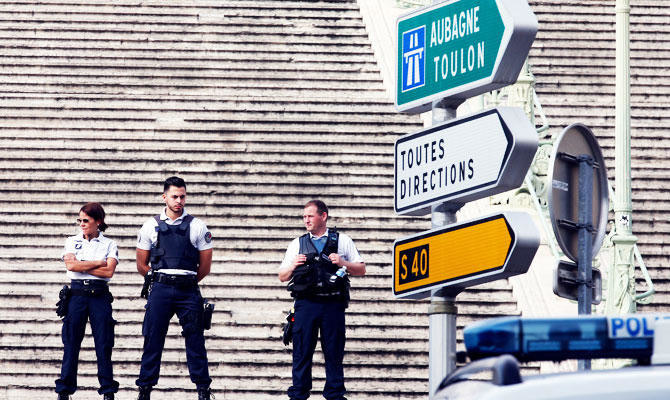
- The arrests took place in the Paris region and in southern France, the PNAT anti-terror unit said
- French prosecutors suspect the eight of preparing and financing terrorist acts
PARIS: French police arrested eight men on Tuesday as part of an investigation into the finances of the Kurdistan Workers Party (PKK), banned as a terror organization by Turkiye and its Western allies, anti-terrorism prosecutors told AFP.
The arrests took place in the Paris region and in southern France, the PNAT anti-terror unit said.
The PKK has been designated a terrorist organization by Turkiye, the United States and the European Union.
French prosecutors suspect the eight of preparing and financing terrorist acts, and of conspiring to extort, or attempt to extort, funds to finance a terrorist organistion between 2020 and 2024, the PNAT said.
Investigators believe the eight to be connected to a campaign to collect funds from Kurdish business people and other Kurds in France, a source close to the case added.
Police can hold the suspects for up to 96 hours for questioning, the source said.
Another source said the funds were destined for use in Belgium, where police on Monday raided Kurdish-run media as part of a probe undertaken at the request of a French anti-terror judge, the PNAT said.
The PKK has waged a decades-long insurgency for greater autonomy for the Kurdish minority of Turkiye in the southeast of the country, in a standoff with the Ankara government that remains unresolved to this day.
Dutch intelligence sees the wars in Gaza and Ukraine as triggers for terrorist threats
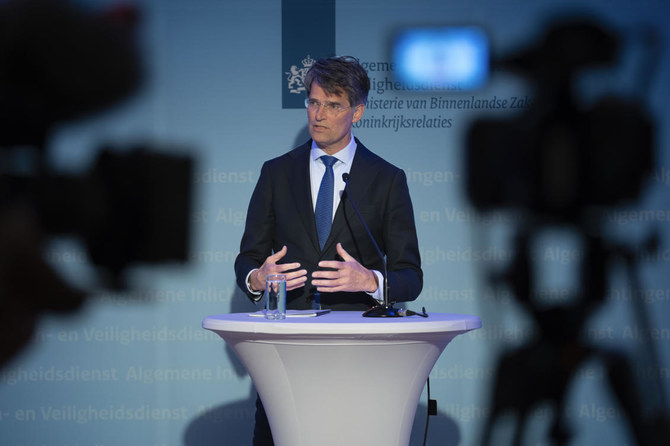
- The Israel-Hamas war in Gaza and the destruction of a Qur’an outside parliament last year are “trigger events” for extremists
- “The terrorist threat is serious at this moment,” the agency’s director-general, Erik Akerboom, told AP
ZOETERMEER, Netherlands: The Dutch national intelligence agency said Tuesday that threats targeting the Netherlands are increasingly connected to worldwide turmoil, including the wars in Gaza and Ukraine.
Although the number of terror attacks across Europe has been down in recent years, the General Intelligence and Security Service in its annual report said the Israel-Hamas war in Gaza and the destruction of a Qur’an outside parliament last year are “trigger events” for extremists.
“The terrorist threat is serious at this moment,” the agency’s director-general, Erik Akerboom, told The Associated Press.
Akerboom said he is particularly concerned about big events, noting that the agency is working closely with French authorities to prevent incidents during the Paris Olympics this summer.
In December, the Dutch counterterrorism agency increased the country’s threat alert to its second-highest level because of concerns about the Daesh group’s Khorasan affiliates, Akerboom said. IS-K, a Central Asian affiliate, was responsible for the attack at a suburban Moscow concert hall that killed at least 133 people in March.
According to the new report, “global jihadism has been the greatest terrorist threat for years in the Netherlands.” Incidents such as the one last April, when an anti-Islam activist tore pages from the Qur’an in front of the Dutch parliament building, put the Netherlands on the map of targets.
About a dozen terror attacks were thwarted by authorities in Europe last year and in four cases, suspects were arrested in the Netherlands, the report said. None of those attacks was focused on the Netherlands, according to Akerboom.
The Dutch also see threats from China, in particular cyberattacks, as a major concern. Akerboom said China is producing more hackers to break into Dutch systems than the Dutch can produce to defend them. The security service has cited China as the biggest threat to the country’s economic security.
Russia also continues to pose a risk to the Netherlands amid Moscow’s full-scale invasion of Ukraine. So-called peace protests in Amsterdam which call for the Dutch to stop sending arms to Ukraine have included demonstrators paid by Russian sources to attend and given prefabricated slogans, the security service has asserted.
The Netherlands is of particular interest to Moscow in part because of the international institutions housed here, including the International Criminal Court. The Hague-based court is investigating crimes in Ukraine and has issued arrest warrants for President Vladimir Putin and other Russians.
Sunak says UK to raise defense spending amid global threats

- “In a world that is the most dangerous it has been since the end of the Cold War, we cannot be complacent,” Sunak told reporters
- The increase in spending from 2.3 percent will see the UK become one of the highest spenders on defense in the 32-member defense alliance
WARSAW: Britain will raise defense spending to 2.5 percent of GDP by 2030 in a “most dangerous” world, Prime Minister Rishi Sunak said Tuesday during a visit to Poland.
The commitment came as NATO countries face pressure to raise defense spending in the face of global threats, particularly from Russia.
“In a world that is the most dangerous it has been since the end of the Cold War, we cannot be complacent,” Sunak told reporters in Warsaw, where he held a press conference with NATO Secretary-General Jens Stoltenberg.
The increase in spending from 2.3 percent will see the UK become one of the highest spenders on defense in the 32-member defense alliance after the United States, the British government said.
It means the UK is expected to spend £87 billion on defense in 2030-31, an increase of £23 billion over current levels.
“I believe we must do more to defend our country, our interests, and our values,” Sunak said, announcing “the biggest strengthening of national defense for a generation.”
Western nations are under pressure to boost defense funding following Moscow’s invasion of its neighbor Ukraine as well as the threat of escalation in the Middle East.
EU chief Ursula von der Leyen recently called for a “European awakening on defense and security.”
Brussels is set to come up with more proposals for financing the defense push by a summit of EU leaders in June.
Sunak has also faced calls from his Conservative Party to boost defense spending, with some calling for a level of three percent of GDP.
On Tuesday, Sunak also announced £500 million additional funding for Ukraine’s war effort against Russia.
A Russian strike on Kharkiv’s TV tower is part of an intimidation campaign, Ukraine’s Zelensky says

- Kharkiv region straddles the approximately 1,000-kilometer front line where Ukrainian and Russian forces have been locked in battle for more than two years
- “Four priorities are key: defense of the sky, modern artillery, long-range capacity, and to ensure that packages of American aid arrive as soon as possible,” Zelensky said
KYIV: Ukrainian President Volodymyr Zelensky said a Russian missile strike that smashed a prominent skyline television tower in Kharkiv was part of the Kremlin’s effort to intimidate Ukraine’s second-largest city, which in recent weeks has come under increasingly frequent attack.
The strike sought to “make the terror visible to the whole city and to try to limit Kharkiv’s connection and access to information,” Zelensky said in a Monday evening address.
The northeastern Kharkiv region straddles the approximately 1,000-kilometer (600-mile) front line where Ukrainian and Russian forces have been locked in battle for more than two years since Moscow’s full-scale invasion of Ukraine. The front line has changed little during a war of attrition, focused mostly on artillery, drones and trenches.
Since late March, Russia has stepped up the pressure on Kharkiv, apparently aiming to exploit Ukraine’s shortage of air defense systems. It has pounded the local power grid and hit apartment blocks.
On Monday, a Russian Kh-59 missile struck Kharkiv’s 250-meter (820-foot) -high TV tower, breaking it roughly in half and halting transmissions.
A Washington think tank said Russia may be eyeing a ground assault on Kharkiv.
“The Kremlin is conducting a concerted air and information operation to destroy Kharkiv City, convince Ukrainians to flee, and internally displace millions of Ukrainians ahead of a possible future Russian offensive operation against the city or elsewhere in Ukraine,” the Institute for the Study of War said in an assessment.
The expected arrival in Ukraine in coming weeks of new military aid from its Western partners possibly has prompted Russia to escalate its attacks before the help arrives, the ISW said, adding that trying to capture Kharkiv would be “a significant challenge” for the Kremlin’s forces.
Instead, the Russian military command “may attempt to destroy Kharkiv City with air, missile, and drone strikes and prompt a large-scale internal displacement of Ukrainian civilians,” it said.
The US Senate was returning to Washington on Tuesday to vote on $61 billion in war aid to Ukraine after months of delays. Zelensky said US President Joe Biden assured him the aid would include long-range and artillery capabilities.
“Four priorities are key: defense of the sky, modern artillery, long-range capacity, and to ensure that packages of American aid arrive as soon as possible,” Zelensky said.
Also Tuesday, Britain pledged 500 million pounds ($620 million, 580 million euros) in new military supplies for Ukraine, including 400 vehicles, 60 boats, 1,600 munitions and 4 million rounds of ammunition.
The shipment will also include British Storm Shadow long-range missiles, which have a range of about 150 miles (240 kilometers) and have proven effective at hitting Russian targets, the British government said.
British Prime Minister Rishi Sunak spoke with Zelensky on Tuesday morning to confirm the new assistance. He was due to announce the aid later Tuesday during a visit to Warsaw where he was meeting with Polish Prime Minister Donald Tusk and NATO Secretary General Jens Stoltenberg.
Less cheering news came from the European Union, however. EU countries that have Patriot air defense systems gave no clear sign Monday that they might be willing to send them to Ukraine, which is desperately seeking at least seven of the missile batteries.
Ukraine’s army is also heavily outnumbered in the fight, and expanding the country’s mobilization has been a delicate issue.
Ukrainian Foreign Minister Dmytro Kuleba on Tuesday signaled that authorities plan to clamp down on young men of conscription age who have moved abroad, with details of the specific measures to be made public soon.
“Staying abroad does not relieve a citizen of his or her duties to the homeland,” Kuleba said on the social media platform X.
Meanwhile, Russia launched 16 Shahed drones and two Iskander-M ballistic missiles over Ukraine’s southern and central regions, the Ukrainian air force said Tuesday morning. It said all but one of the drones were intercepted.
In Odesa, an overnight attack injured nine people, regional Gov. Oleh Kiper said. Among those injured were two infants and two children aged nine and 12, Kiper said. City mayor Hennadii Trukhanov said 58 apartments in 22 buildings were damaged.
In other developments:
A Russian missile strike near Dnipro, Ukraine’s fourth-largest city, injured four people who were admitted to hospital, regional Gov. Serhii Lysak said.
Russian forces dropped a guided aerial bomb in Kostiantynivka, a city in the eastern Donetsk region, injuring five people who were riding in a car, police said. Two of them were in critical conditions.



